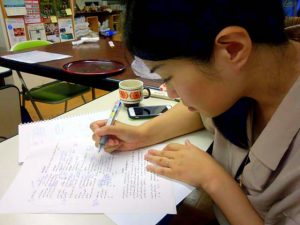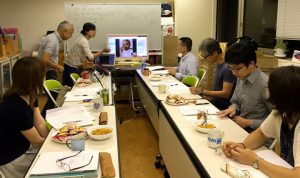[Original by Asako SHIRAKAWA, a member of the JVC Afghanistan Volunteer Team (March 9, 2017); Translated by A. Shirakawa/R. Florea]
Outline
The JVC Afghanistan Volunteer Team has held “Pashto Class” once a month since August 2016. Pashto is one of the official languages in Afghanistan. As far as we know, there is no such a Pashto class in Japan. It is also our first trial of language course as an activity of the volunteer team. We already had 6 sessions, in which 7 to 8 members attended every time.
The class is for two hours. In the first half, we learn basic Pashto from a Japanese teacher (Mr. Fujii or Ms. Kato). In the second half, we practice Pashto by talking with a JVC Afghanistan staff (Mr. Sabirullah) through Skype online. In this way, we can learn native pronunciation and basic phrases useful in daily conversation such as greetings and self-introduction. We practice pronunciation by communicating each other in the members. Sometimes we learn Pashto from the lyrics of music currently popular in Afghanistan.
Significance of the “Pashto Class”
This class has a variety of significance like offering a working place for volunteers and understanding the unique culture of Afghanistan through language lessons. In addition, it provides grassroots interaction between Afghanistan and Japan as a part of the campaign “Don’t Forget Afghanistan”, and gives an opportunity to communicate with an Afghan staff. It is not only a language class but also a place for members to get together and experience cross-cultural exchange. It is the passion and eagerness of members, which supports the present class.
How was the “Pashto Class” born?
In July 2016, I attended a debrief session about the visit to Afghanistan by the staff of JVC Tokyo Office. Mr. Sabirullah, a JVC local staff, sent us a video message for this session. I wanted to thank him and sent him my message back. Then he taught me some Pashto phrases, for instance, “Salam (Hello)” and “Deera Manana (Thank you so much).” It inspired me to start a Pashto Class as a voluntary activity, since the activity of the Afghanistan Volunteer Team was slowed down at that time. I suggested him to start a Pashto Class together by inviting him as a teacher. He immediately agreed. I thought it would be the best chance to enhance mutual understanding of Japanese and Afghan people through grassroots exchange.
The structure of mutual support
This class has a unique feature that we Japanese “are taught” by an Afghan teacher. It means that we “are supported” by Afghan people, in contrast with normal cases of international cooperation where we support them. In the actual scenes of international cooperation, Japanese and local staff may work together in order to implement various projects. However, we often see only one side of the cooperation that Japan supports Afghanistan. In this Pashto Class, on the other hand, Mr. Sabirullah plays a role of teacher and we are taught or supported by him. By incorporating this kind of system in the class, we naturally understand the structure of mutual support inherent in human beings: compensate for mutual deficiency.
A hope that we find out through equal exchange
I hear that Afghanistan is in the most difficult social situation. People have difficulty in finding hope. I think, however, that hope is not limited in material richness. It should rather be found in the richness of relationship between people.
Although there are a lot of differences between Japan and Afghanistan, we learned through the Pashto class that there are many things in common. We laugh and get delighted or surprised together, taking care of each other. There is no difference in such things. Mr. Sabirullah always looks forward to this class. Despite being so busy, he makes time for this class every time. We need him as a teacher, and I guess that he also needs us as students who can give some sorts of support to his daily life. A sense of being needed by somebody gives us a reason for living, which leads to hope. I believe that our person-to-person equal exchange supports Afghan people, who may face many difficult situations. Hope doesn’t exist outside but inside a human being.
Share This:

